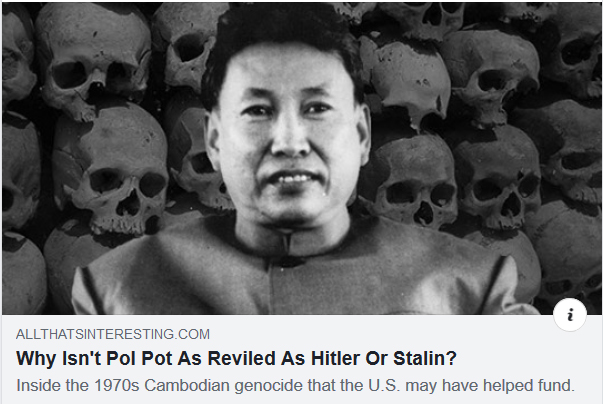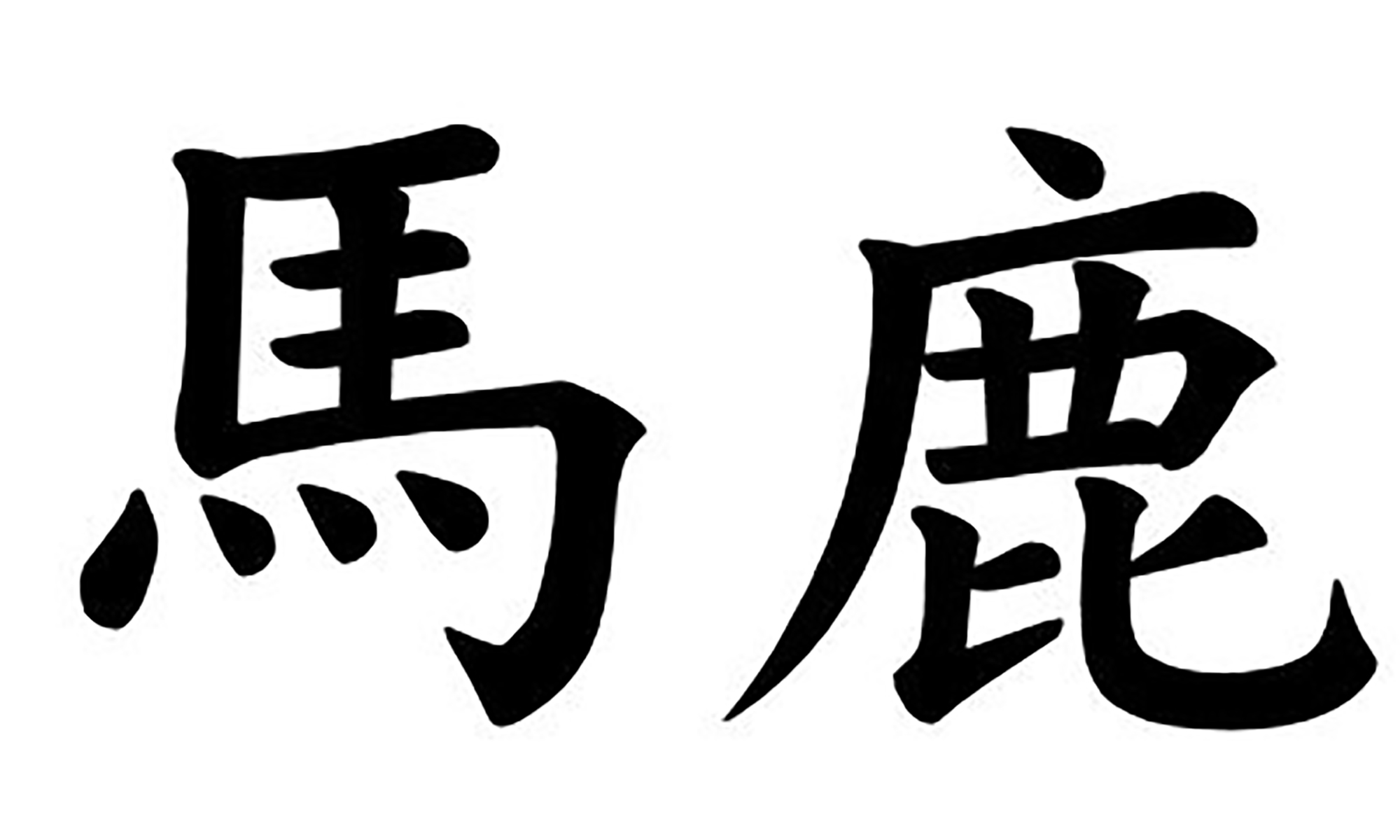A friend shared this article on Facebook:

Now, admittedly, if you go to the article, that’s not the actual headline. And that question is not actually answered, because the article is really a history of Pol Pot and what led up to and then transpired during the Khmer Rouge genocide in Cambodia in the late 1970’s. But it is an important question, because frankly, if you were to ask someone (like a millennial*) today who Hitler or Stalin were, you’d probably be able to get a reasonable answer on Hitler (“he killed the Jews in Germany”) and you might find a few who could tell you that Stalin was the great leader of the Soviet Union who killed millions of people in famines and wars and stuff yet is still loved and revered by the people he led** (and is not, in fact, your neighbor’s German Shepherd police dog).
But if you ask “Who was Pol Pot?”, my guess is that most people today, including a lot of people who were alive at the time, would give you the old puzzled look.
So why isn’t Pol Pot as reviled as Hitler or Stalin, as the teaser headline trenchantly asks, while the article it links to fails of that promise to tell us?
I think because at the time, the US had pretty much washed its hands of Southeast Asia. Nobody talked about it and nobody taught the history of the region, which was small and way off in the middle of nowhere in a place where we’d only recently been shown the door and Americans were to all intents and purposes persona non grata. And even once the whole Cambodian Genocide was over, again, nobody in the West other than hippies and commies (who blamed the whole thing on Americans, who of course had walked away before it even started) wanted to be bothered with it, or reminded again of American failures in Southeast Asia — particularly Vietnam, but sure, Cambodia, too.
But it’s hard to rouse the same amount of interest in bad stuff happening to people in parts of the world to which we have little or no personal connection. The Shoah speaks to Jews and Christians alike, because it was Westerners going insane and killing other Westerners for no more reason than the religion they professed. We keep the memory alive because many of us lost family and friends in the camps, or lost family and friends fighting the war that put an end to the camps. There is a very personal connection involved (at least for those Americans who don’t stupidly believe that the Shoah was a hoax). So it gets remembered and talked about and is a part of our history.***
Yet the same kind of thing is happening today in Myanmar (the so-called Rohingya genocide; so-called because it’s questionable if it’s a true genocide or just a really nasty refugee crisis). For that matter, see what the Chinese are doing to the Muslim Uighur populations in Xinjiang Province. You read articles about these things from time to time (particularly if you read conservative or libertarian media and blogs), but like Vietnam and Cambodia, it’s so far outside of our daily grind that it doesn’t really impinge on our consciousness. We know it’s happening, we’ve just got too much on our plates that’s more immediate than whatever is happening over on the other side of the world. So it hovers, if at all, at the back of our minds until the next article appears, raging at the unfairness of it all. We read it, go “tsk tsk” about the horrors of the non-Western world, and we move on to the baseball scores.
In my opinion****, Pol Pot in his way certainly was as bad as Hitler or Stalin or Mao (and why doesn’t that headline mention Mao, who was probably the champion of genocide in the 20th Century — 15 to 55 million dead in the Great Leap Forward). The problem is, Pol Pot’s genocide was small potatoes (between 1.7-1.9 million killed) in a place nobody in the West gave a damn about. So unless you are an historian specializing in recent SE Asian history, it just doesn’t tend to come up.
I’m not sure if that’s a good thing or a bad thing. But like I said in my headline, the world is a big fucking place and it’s damn hard to keep track of what 7 billion human beings are doing. So I think we can be forgiven if we have generally forgotten about people like Pol Pot.
_______________
* I know I beat up on millennials a lot around here, but the fact is that they were the first generation to be truly and fully engulfed by the Gramscian Damage, and thus if they were taught any history at all, it was likely heavy on the Bad Things done by the Evil Americans and silent on the Bad Things that were done by the Commies in Southeast Asia, back in the ’70s. This is really not their fault, but ferchrissake, you kids could pick up a book now and then instead of hanging out on social media all fucking day.
** Jeebus, talk about Stockholm Syndrome, the entire fucking Soviet Union and the Russian Federation that followed it had it bad for Stalin. It’s no wonder they keep electing Putin.
*** My fellow Jews won’t like to hear this, but my guess is that the Shoah will be barely remembered in another 3-5 generations, other than as the reason for commemorating Yom Ha-Shoah and mentioning the 6 million martyrs during the Yiskor service on Yom Kippur. The survivors’ generation will be gone (they are nearly all gone now) and the succeeding generations (like mine) who knew the survivors first-hand will be gone or nearly gone. Face it, who remembers the details of the pogroms, or of the loss of the two Temples? The former is dry history relegated to books and is rarely evoked unless you specialize in Russian or Eastern European history, the latter is legend in the Bible (First Temple) and stories in Roman and Christian chronicles (Second Temple). None of it gets much play in a standard Western Civ. textbook or course. As time goes by and memories fade, the Shoah, too, will be relegated to history, no matter how hard we try.
**** It’s an informed opinion; I remember the Vietnam era quite well (for someone who was in grade and middle school at the time, I happened to take an interest and the newspapers were loaded with stories about it), and I remember the Cambodian Genocide being reported when I was in high school, and after. Then I went to college, where my area of historical specialization was — other than American Diplomatic and Military History — the History of East and Southeast Asia,
